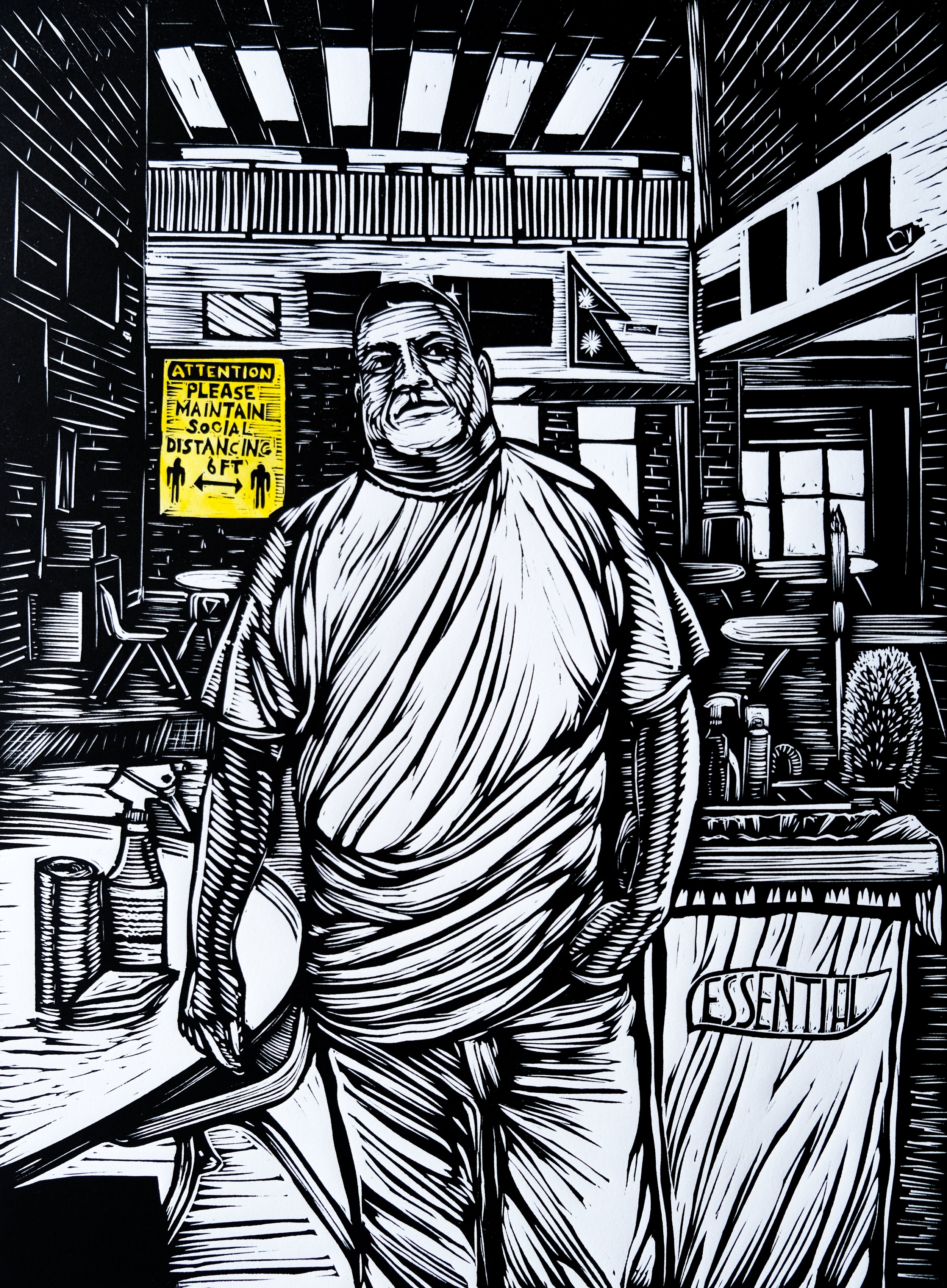Sun Valley Essential Workers 2022
In August 2021, I was invited to partake in an artist in residency in in the Wood River Valley, in Idaho. The Sun Valley Museum of Art specifically reached out to me because of my essential worker’s series, and I was invited to interview some of their essential worker’s during the pandemic. During my stay, I had the pleasure of interviewing and connecting with a variety of people who did not have the luxury to work from home and shelter in place, because their work required them to continue to serve their community and provide for their family. Some of these people included: a school janitor, medical staff from the local hospital, grocery store clerks and volunteers and staff who helped distribute food to those in need.
For this project, I interviewed over 10 people, and I ended up creating a total of 7 new prints which are going to be exhibited at the Sun valley Museum of art this upcoming month, with an opening reception this Friday, April 1st, 2022. For more information about the exhibit, please visit the Sun Valley Museum of art Website.
It was a honor to create these portraits of these essential workers during the pandemic, and it is my hope that you can all take some time to pause, reflect, appreciate and thank those people who have always been,and continue to be the backbone of this nation.
Juan (Johnny)
. Meet Johnny, a high school custodian whose job was, and continues to be crucial to keeping our schools safe for our students and staff. “We are the front line. [Covid] has been a changer for us custodians. I’m here at 5am… and sometimes at 3am.” He said, as he was showing me all the protocols he’s had to enforce, so students and staff could be safe coming to school.
“…Wearing masks. Making sure we’re wearing gloves when we’re cleaning. All the teachers have Ziploc bags with brand new towels, a spray bottle to disinfect. Every day that the custodians clean, they make sure that the rags are taken out, washed, and replaced. We started having sanitizers everywhere. We didn’t have them before. Plexiglass, In the front office, the library, and everywhere else.” are just some of the things Johnny had to do in addition to his other responsibilities.
“Before, we weren’t considered [essential]… I am happy that we are needed, especially now. We are the frontline, if we don’t work, people will get sick.”
As an elementary and middle school teacher, I have always valued and appreciated the work that our janitors do for our schools and greater community, not just during this pandemic, but all the time. Janitors wear many caps and at times serve as first responders during a time of crisis. Like Johnny said, “we are the eyes of the school,” and this, I know to be true, they are a big reason I feel safe to get up every morning and go in and teach my students during a pandemic and/or a pandemic free world.
Thank you Johnny.
Dolores
I would like to introduce Dolores Vega, she is the resource and advocacy Supervisor for the @Hunger Coalition, a food justice organization that builds community through healthy food education and access in Bellevue, Idaho.
“For us, shutting down at the beginning of the pandemic was not an option. For us, that was when we had to work the hardest. We needed to provide everyone we could with food. It was a time when we had to become more diligent on keeping our community safe, getting more resources, and providing food to everyone who needed it.” And Thanks to their quick response Dolores and her team were able to safely serve 350-500 people a day. “It was amazing how we came together as a well-oiled machine,” she said as she gave me the tour of the facility.
During the pandemic, the organization also made phone calls to the seniors that they served. “We do home deliveries on Wednesdays to make sure that they are taken care of.” She said. “Isolation is one of the worst enemies during Covid. It was for all of us, being homebound and not being able to have that human connection was so hard. That’s why we concentrate[d] on having that little interaction. I think it’s so important. The food is important but keeping that connection… Because if that breaks, you can still have the food, but you need that [human interaction].”
Thanks to Dolores, the volunteers and the staff, the Hunger coalition was able to respond quickly to the community’s needs throughout the pandemic.
If you want to learn more about the hunger coalition, its sister organizations, and the resources it provides to the valley’s community please go to: https://thehungercoalition.org/
Thank you, Dolores!
Migdaelma
La siguiente persona que tuve el honor de entrevistar se llama Migdaelma, y ella es de Agua Dulce, Guatemala. Migdaelma tiene desde el 2012 viviendo en Sun Valley con su familia, y ella es una voluntaria para el Bloom Farm que es parte de él Hunger Coalition en el Wood River Valley en Idaho. A través de este programa de alimentos y jardinería, los miembros de la comunidad pueden ser voluntarios durante una hora a cambio de una parte de las verduras. El programa también tiene un programa de nutrición dirigido por otro miembro del personal en conjunto con St. Luke's, una organización hermana. Los nutricionistas o dietético vienen y hablan con los miembros de la comunidad sobre problemas de salud específicos y cómo la dieta podría ayudar con eso y pueden llevarse una parte de las verduras a casa.
Durante la pandemia Migdaemla ofreció su tiempo con su hija e iban al Bloom y Hope Garden para ayudar en los trabajos diarios del jardín comunal. "Yo hago lo que ellos necesitan. Si necesitan desyerbar, cortar y recoger lo que ya se da, o sembramos también. Pasó como dos horas. Dos horas aquí por cuándo vamos a la otra locación. Vamos los lunes, Jueves y a veces los Miércoles," dijo mientras desyerba las matas de jitomates.
"A mí me gusta [ayudar en el jardín], y me ayuda porque se me despeja la mente, me concentro en las plantas y me parece que hay una conexión entre las plantas, la tierra y uno. Porque de hecho somos hechos de tierra, cuando uno muere se vuelve tierra", mencionó mientras recordaba sobre sus experiencias en las fincas de café Guatemala. "Y así, crecí con mis papas. Y a ellos hasta la fecha les gusta la siembra–donde yo vivo es café. Mi mamá me llevaba a cortar café, entonces a mí me gusta– me hace sentir bien."
Muchas Gracia Migdaelma por compartir tu historia conmigo, y por dar su tiempo en los jardines comunitarios del Valle de Wood River.
Verlene
Despite the uncertainties early in the pandemic, these essential workers went out performed their everyday jobs, and even went above and beyond what was expected of them to ensure that they were keeping themselves and their community safe. I would like to introduce a person who you all interacted with one way or another during the pandemic. Her name is Verlene, and she worked at her local grocery store—stocking shelves and or cashing people out for their everyday groceries. Unlike some of us, these she had to physically work in the middle of the pandemic to financially support herself and her family.
These prints were created to thank and honor those realities of those people who were and continue to be the essential tapestry and foundation of this nation.
Rovelyn
“It’s been crazy! People have masks, some [dont’].” She said as she explained how difficult it has been to grapple with covid related loss and grief while being the primary provider for her children who live in the Philippines. “I ask [customers] where is your mask? Some are rude… I need to come to work, for my kids. My kids come first.” She mentioned as she placed my groceries in the bag.
We are aware that the Covid-19 pandemic has disproportionately impacted communities of color in the US, and on a global scale has ravaged through many developing nations like the Philippines. When Rovelyn was asking customers about masks, she was simply following the CDC guidelines, her work policy and most importantly, trying to stay safe so she could one day see her children again.
These prints were created to thank and honor those realities of those people who were and continue to be the essential tapestry and foundation of this nation.
Fidel
In the beginning of the pandemic—the science and the CDC protocols kept changing, and there was little information on the effects of covid (because it was so new). Hospitals were short staffed and people who worked in our healthcare system were stretched thin, often asked to work and take over tasks that were outside of their specialized area. Today I would like you to meet the final two people that I had the honor of interviewing during my stay in the Wood River Valley of Idaho. Meet Fidel and Kathy, two Medical Laboratory Scientists whose work responsibilities changed when we went on lockdown.
“We had so many of our frontline nurses and doctors who had covid or were exposed to it before we knew much about it that we had to shut the hospital down, and [send] people to Twin or Boise.” Said Kathy B. a Medical Laboratory scientist who had to wear many hats in the hospital during the Covid surge. “I used to drive to work with a stomachache. It was all surreal… the protocols kept changing, about where to send the swabs...” She said. “And then the method of collection,” added Fidel, another Medical Laboratory scientist who works for St. Luke’s Wood River Hospital. “Nose. Mouth. Throat. It was unknown territory. Our hands got so tired from opening up and labeling Ziploc bags. [Initially] we did 100, 200 tests a day. Plus, we had to take care of the ER, too. Car accidents. There were other things going on, [and] we were short-staffed. We were so tired.”
“I think this has taken such a toll on everyone.” Kathy added. “Whether they were an essential worker or not. And not just the United States. Our whole world. It will be interesting to see how we come out of it.”
Being a frontline worker is a monumental task and when the US had its first Covid surge, these frontline medical staff were overworked and at times did not have to proper PPE to protect themselves against the virus. Healthcare workers and other essential workers were (and continue to be) at a higher risk of contracting covid 19, and if there is something that we can do as a community, is stand in solidarity and help advocate for better working conditions for all workers that we deem as essential.







